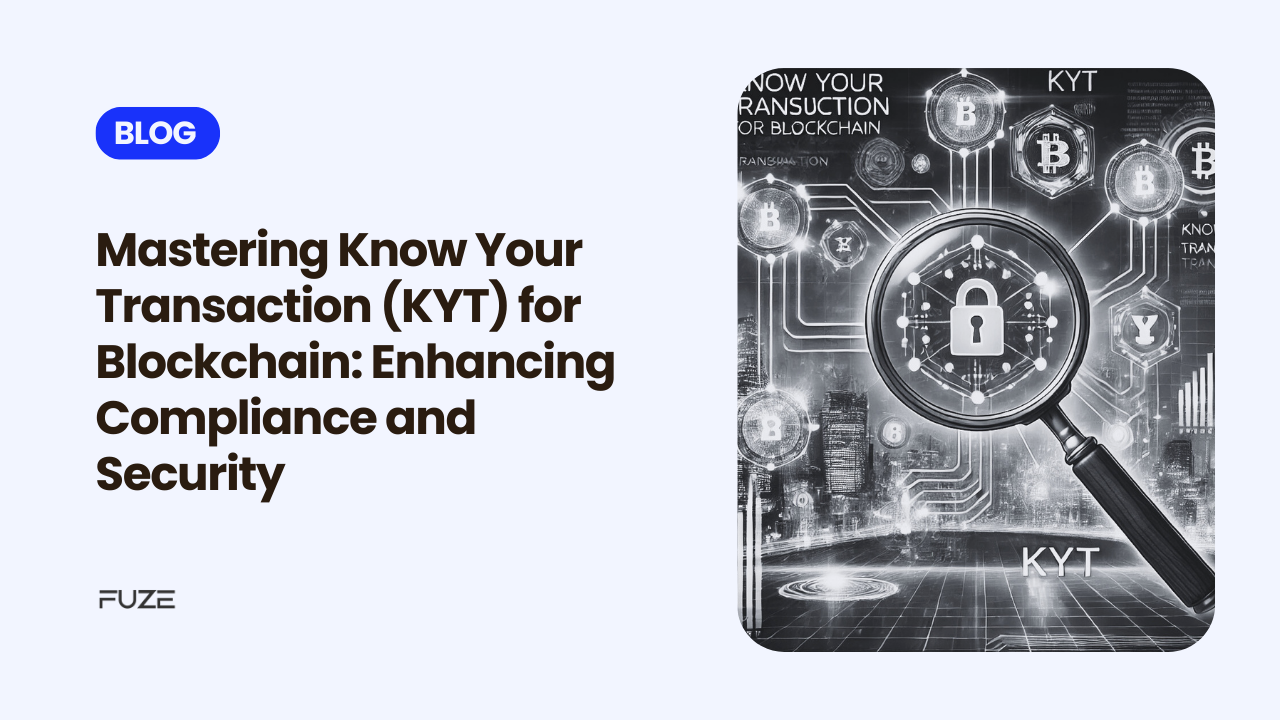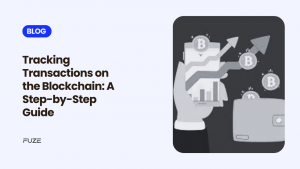Blockchain adoption is surging at an unprecedented pace, revolutionizing industries with unmatched speed and efficiency. However, with the rapid adoption of Web3, the digital asset ecosystem is facing an alarming rise in sophisticated hacks, fraud, and illicit transactions. These challenges highlight the pressing need for advanced compliance tools to ensure secure and lawful operations in the blockchain space.
Know Your Transaction (KYT) has emerged as a vital solution, enabling real-time monitoring and analysis of blockchain transactions. It is a critical methodology for monitoring and analyzing blockchain transactions in real-time. KYT empowers businesses, financial institutions, and regulators to detect suspicious activity, prevent fraud, and maintain regulatory compliance. By implementing KYT, stakeholders can safeguard the integrity of their operations while fostering trust in blockchain technology.
In this blog, we will delve deeper into the concept of KYT, exploring its importance, core functionalities, and real-world applications. We’ll also highlight how KYT can mitigate security risks and align with the rapidly evolving regulatory landscape in blockchain.
What is KYT?
Know Your Transaction (KYT) refers to the process of analyzing and monitoring blockchain transactions to detect potentially suspicious or fraudulent activity. Unlike Know Your Customer (KYC), which verifies the identity of individuals, KYT focuses on the behavior and context of transactions. By leveraging advanced analytics, KYT provides insights into transaction patterns, origins, and destinations, enabling organizations to identify and mitigate risks effectively.
KYT is especially important in blockchain environments, where pseudonymity can mask the identities of the participants in a transaction. Through the analysis of fund flows, KYT reveals illegal activities such as money laundering, terrorist financing, and fraud.
Why KYT is Essential in Blockchain
- Regulatory Compliance: The rapid growth of blockchain and cryptocurrencies has attracted the attention of regulators worldwide. Governments and financial watchdogs now require organizations to implement stringent anti-money laundering (AML) and counter-terrorist financing (CTF) measures. KYT is indispensable for ensuring compliance with these regulations, providing a framework for continuous monitoring of transactions and reporting suspicious activities.
- Risk Mitigation: Blockchain’s transparency is a double-edged sword. While it allows for traceable transactions, it also creates opportunities for bad actors to exploit the system. KYT solutions enable businesses to identify high-risk transactions and take preventive actions, safeguarding their reputation and avoiding legal repercussions.
- Enhanced Security: KYT tools leverage advanced screening and investigation techniques to detect anomalies in transaction data. Such technology can monitor regular patterns that may indicate hacking attempts, fraud, or unauthorized access for the protection of critical ecosystems of digital assets.
How KYT Works
KYT systems work on real-time analysis of blockchain transaction data. Here are the key components:
- Data Aggregation: The KYT tool collects data from blockchain networks, wallets, and exchanges.
- Risk Scoring: A risk score is assigned to every transaction with predefined criteria, such as the size of the transaction, its source, and destination.
- Alerts and Reporting: Suspicious transactions trigger alerts, prompting further investigation or reporting to regulatory authorities.
KYT solutions are often integrated with existing compliance tools, enabling organizations to streamline their AML and CTF processes while maintaining operational efficiency.
Key Applications of KYT
1. Cryptocurrency Exchanges
Cryptocurrency exchanges serve as the primary gateways for users to enter and exit the blockchain ecosystem. As such, they are high-risk environments for money laundering and fraud. KYT enables exchanges to monitor transactions across multiple cryptocurrencies, ensuring compliance with global regulations.
2. DeFi Platforms
Decentralized finance (DeFi) platforms operate without intermediaries, making them attractive to both legitimate users and bad actors. KYT tools help DeFi platforms maintain compliance and detect illicit activities, such as wash trading or rug pulls.
3. Payment Gateways
Crypto payment gateways facilitate real-time transactions for businesses and consumers. KYT ensures that these transactions are secure and comply with AML and CTF standards, fostering trust among users.
4. NFT Marketplaces
Non-fungible tokens (NFTs) have become a lucrative avenue for digital art and collectibles. However, they also pose unique challenges in tracking provenance and preventing fraud. KYT solutions can monitor NFT transactions, ensuring their legitimacy and compliance.
Benefits of KYT
- Proactive Fraud Prevention: KYT identifies suspicious activities before they escalate into significant threats, enabling organizations to act swiftly.
- Regulatory Assurance: By implementing KYT, businesses demonstrate their commitment to compliance, reducing the risk of penalties and enhancing their credibility.
- Improved Customer Trust: Customers are more likely to engage with platforms that prioritize security and compliance, boosting user confidence and retention.
- Operational Efficiency: KYT tools automate the monitoring process, reducing the need for manual intervention and allowing businesses to allocate resources more effectively.
Challenges in Implementing KYT
While KYT offers numerous benefits, its implementation is not without challenges:
- Data Complexity: Blockchain networks generate vast amounts of data, making it challenging to process and analyze transactions in real time.
- Evolving Regulatory Landscape: The lack of standardized global regulations can complicate KYT adoption, as businesses must navigate differing requirements across jurisdictions.
- Integration with Legacy Systems: Many organizations struggle to integrate KYT solutions with their existing compliance infrastructure, leading to inefficiencies.
- Cost and Resource Constraints: Deploying KYT tools can be resource-intensive, particularly for smaller businesses or startups.
Future Trends in KYT
- AI and Machine Learning: The combination of AI and machine learning will enable KYT to better detect sophisticated schemes of fraud and keep pace with changing threats.
- Smart Contract Analysis: Smart contracts are an integral part of the web3 ecosystem, but code errors and weaknesses like access control act as a gateway for illicit actors looking to exploit vulnerabilities. KYT solutions will evolve to monitor smart contract activities across different blockchains, providing a more comprehensive view of risks.
- Global Standardization: Efforts to harmonize AML and CTF regulations globally will streamline KYT implementation and improve its effectiveness.
- Decentralized KYT: Innovations in decentralized identity and privacy-preserving technologies may enable KYT solutions that balance compliance with user privacy.
Conclusion
Mastering Know Your Transaction (KYT) is essential for businesses and regulators navigating the complexities of the blockchain ecosystem. By enhancing compliance, mitigating risks, and improving security, KYT not only protects organizations but also fosters trust in blockchain technology. As blockchain adoption continues to grow, KYT will play a pivotal role in shaping a secure and compliant digital future. Businesses that invest in KYT today are not just safeguarding their operations but also contributing to the broader goal of responsible innovation in the blockchain space.
Disclaimer: Virtual assets carry significant risks, including high volatility and potential loss of your entire investment. They are not backed by governmental protections, and recourse may be limited in case of loss. Always assess your risk tolerance, fully understand the risks, and seek independent financial advice if needed before investing.
Frequently Asked Questions
How does KYT benefit businesses in the blockchain space?
For businesses, KYT improves regulatory compliance, reduces the risk of fraud, and builds trust with customers and stakeholders. It also prevents potential fines and legal issues related to non-compliance, ensuring the business operates within the boundaries of the law.
Can KYT be implemented on all blockchain networks?
Yes, KYT can be implemented across various blockchain networks, including Bitcoin, Ethereum, and others. However, its effectiveness depends on the blockchain’s transparency and the tools used for monitoring transactions. Public blockchains tend to offer more visibility, making KYT implementation easier.
What are some challenges in implementing KYT for blockchain?
One of the main challenges is ensuring real-time transaction monitoring without compromising privacy. Additionally, the pseudonymous nature of blockchain transactions can make it difficult to trace the true identity of users, complicating the process of detecting illicit activities.
How can blockchain analytics tools assist in KYT?
Blockchain analytics tools provide businesses with the technology to track and analyze transactions on the blockchain. These tools use algorithms to detect patterns and flag transactions that deviate from typical behavior, helping to ensure compliance with regulatory standards.
What impact does KYT have on the future of blockchain compliance?
As blockchain adoption grows, KYT is expected to become a cornerstone of compliance frameworks. By automating the transaction monitoring process, KYT solutions will enable faster and more efficient regulatory reporting, thereby enhancing the scalability and sustainability of blockchain technologies in regulated industries.







